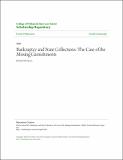| dc.description.abstract |
Recent bankruptcy reforms were spurred in part by a bankruptcy filing rate that has more than doubled in the last ten years and that has risen by approximately six hundred percent over the last generation. Some attribute this surge in filings to Americans’ greater willingness to avoid debts by declaring bankruptcy. Most academics, however, argue that more Americans are forced into bankruptcy by crushing debt burdens and aggressive collections techniques. Surprisingly, the literature has largely ignored data on the use of these collections techniques. This Article examines the use of one of the most important collections tools, garnishment, in two jurisdictions: the Commonwealth of Virginia and Cook County, Illinois. While the bankruptcy filing rate has risen dramatically in each of these jurisdictions, the rate of garnishment has declined. Because prior studies specifically cite garnishment as one of the leading triggers of bankruptcy, the “missing garnishments” in each of these jurisdictions challenge the claim that an increase in financial distress has caused the rise in bankruptcy filings. |

